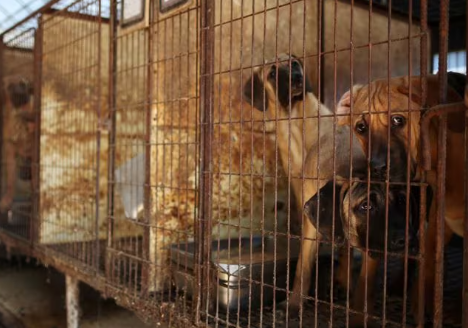South Korea parliament has passed a new law, which aims to end slaughtering and selling of dog meat by 2027 amid rising support for animal welfare.
The law aims to end the centuries-old practice of eating dog meat, once seen as a way to improve stamina in the humid Korean summer. It is now however eaten mostly by older people as young people shun it according to reports.
The ban has garnered support under President Yoon Suk Yeol, an animal lover who has adopted six dogs and eight cats with first lady Kim Keon Hee, also a vocal critic of dog meat consumption.
The bill was approved on Monday by the agriculture committee passed the parliament on Tuesday by an overwhelming 208 votes with two abstentions. It now heads to President Yoon Suk Yeol for final approval.
Under the law, raising or slaughtering dogs for consumption will be banned, as will distributing or selling dog meat. The law will also ban the distribution and sale of food products made or processed with dog ingredients, according to the corresponding committee of the National Assembly.
Those butchering dogs could face up to three years in prison or 30 million won ($22,800) in fines, while those who raise dogs for meat or sell dog meat could serve a maximum of two years.
However, customers who consume dog meat or related products will not be subject to punishment
In a survey released on Monday by Animal Welfare Awareness, Research and Education, a Seoul-based think tank, more than 94% of respondents said they had not eaten dog meat for the past year and about 93% said they would not do so in the future.
The new legislation will come into effect in three years’ time, giving farmers and restaurant owners time to find alternative sources of employment and income. They will have to submit a plan to phase out their businesses to their local authorities.
The government has promised to fully support those affected by the new law, though the details of what compensation will be offered remains unknown.
According to government statistics, South Korea had around 1,600 dog meat restaurants and 1,150 dog farms in 2023.
Although the bill has been praised by animal activists, it has also met fierce resistance from dog farmers and business owners who say it will devastate their livelihood and traditions.
Lee Kyeong-sig, a dog farmer told Reuters last November: “If I have to close down, with the financial condition I’m in, there really is no answer to what I can do … I’ve been in this for 12 years and it is so sudden.”
Ifunanya Ikueze is an Engineer, Safety Professional, Writer, Investor, Entrepreneur and Educator.
























































